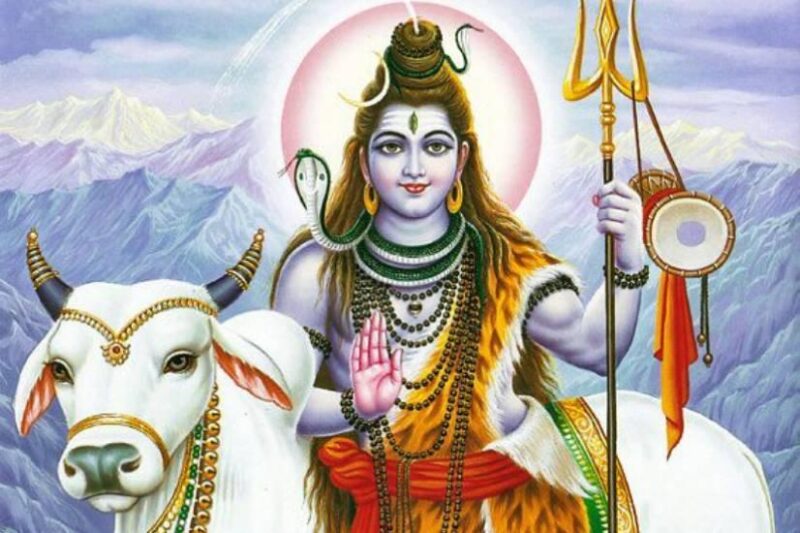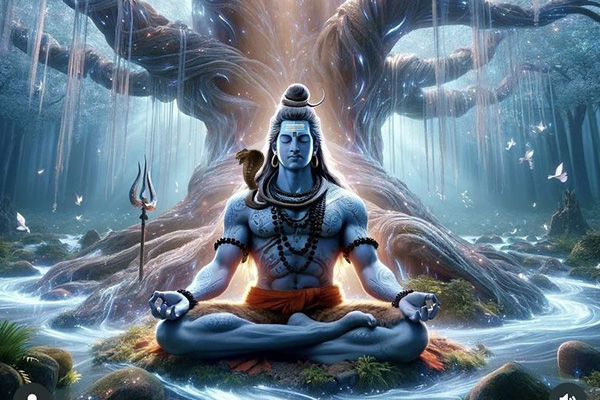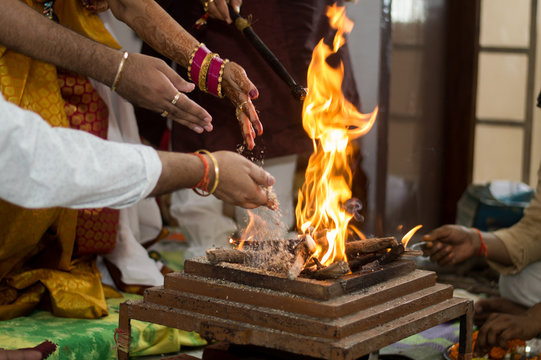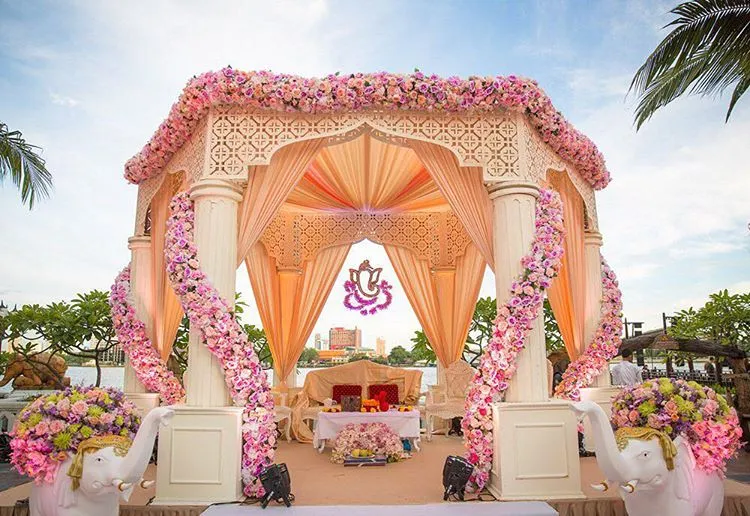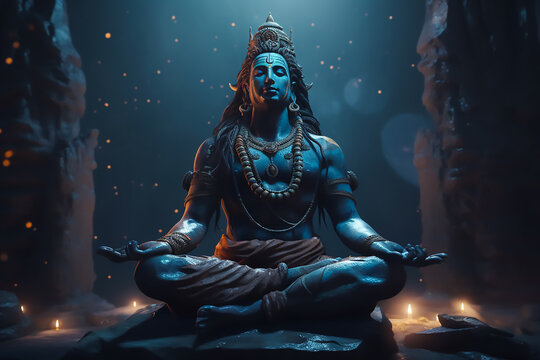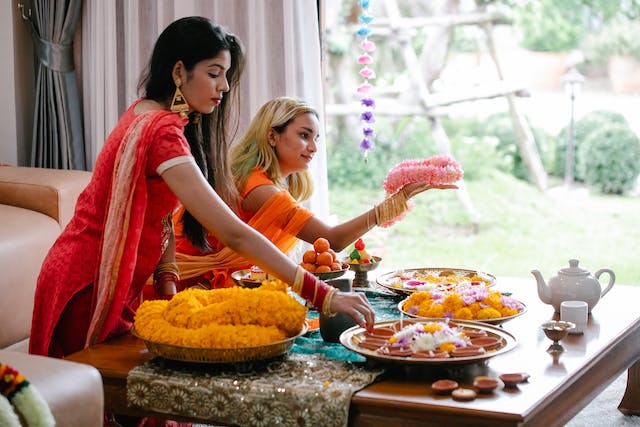Indian wedding ceremony
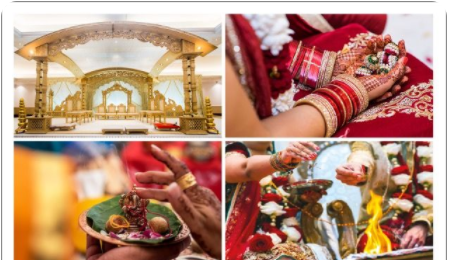
Indian wedding ceremony
Here are some delightful details about the Indian wedding ceremony which will help you to plan your wedding and make the special day of your Life!!
Indian wedding ceremony are known for their elaborate and colorful celebrations that last for several days. These Indian weddings are a mix of traditional customs, religious rituals, and modern trends. The customs and traditions of Indian weddings vary based on the religion, region, and community of the couple.
Indian wedding preparations usually start several months in advance and involve a lot of planning and coordination. The ceremonies usually begin with the engagement ceremony where the bride and groom exchange rings and families exchange gifts with help from the wedding priest.
The pre-wedding ceremonies include Haldi, Mehendi, Sangeet, and others. Haldi involves applying turmeric paste to the bride and groom’s bodies to purify and cleanse them. Mehendi involves applying henna designs on the bride’s hands and feet. Sangeet is a musical evening where family and friends come together to sing, dance and celebrate. Nowadays groom is also applying henna just the name of his partner.
The Indian wedding day starts with the groom’s arrival at the wedding venue on a horse or a car, accompanied by his family and friends. The bride’s family welcomes the groom with flowers and performs aarti, a Hindu ritual of worship. The Indian wedding ceremony, depending on the religion, includes several customs and rituals like Kanyadaan, Saat Phere, Mangalsutra, and others.
The reception usually takes place in the evening after the Indian wedding ceremony. It is a grand affair with a lot of food, music, and dance. The newlyweds and their families and friends come together to celebrate and have fun.
Indian weddings are a unique experience that brings together families and friends to celebrate the union of two individuals. The rich culture and traditions make it an unforgettable experience for everyone involved.
The wedding priest, also known as the Hindu pandit for a wedding or the priestly figure, plays a crucial role in Indian weddings. They are responsible for conducting the religious Indian wedding ceremonies and rituals that take place during the wedding.
In Hindu weddings, the wedding priest performs a variety of wedding rituals like Kanyadaan, Haldi, Saptapadi, and Mangalsutra. During Kanyadaan, the priest performs a ceremony where the bride’s father gives away his daughter to the groom. During Haldi, the priest applies turmeric paste to the bride and groom’s bodies to purify and cleanse them. During Saptapadi, the Hindu wedding priest ties the knot between the bride and groom and performs seven vows, each representing a different aspect of marriage. Finally, during Mangalsutra, the priest ties a sacred thread around the bride’s neck, symbolizing her marriage.
In Sikh weddings, the wedding priest is known as the Granthi, and they are responsible for reading from the Guru Granth Sahib, the holy book of the Sikh religion. The Granthi performs the Anand Karaj ceremony, which involves the couple taking four vows in front of the Guru Granth Sahib.
In Muslim weddings, the wedding priest is known as the Qazi or the Maulvi. They perform the Nikah ceremony, which involves the couple exchanging vows and signing the marriage contract.
Overall, the wedding priest plays a critical role in Indian weddings, ensuring that the religious ceremonies and rituals are performed correctly and with utmost sanctity. They provide guidance and support to the couple and their families throughout the wedding process, ensuring that everything runs smoothly.
Indian wedding importance
Indian weddings are significant cultural and social events that hold great importance in the Indian community. These weddings are not just about two people getting married but also a celebration of family, tradition, and customs. Here are some reasons why Indian weddings are so important:
Family Bonding: Indian weddings bring families together and are a great way to strengthen family bonds. Family members from different parts of the world come together to celebrate the union of two people and to show their support and love.
Tradition and Culture: Indian weddings are steeped in tradition and culture. Each wedding ceremony has a specific meaning and significance, and all of these ceremonies are deeply rooted in Indian culture and traditions.
Festive Atmosphere: Indian weddings are joyous and colorful events that create a festive atmosphere. There is music, dancing, and delicious food that make the wedding celebrations a memorable experience.
Religious Significance: Indian weddings often have religious ceremonies that are an important part of the wedding. These ceremonies are conducted according to specific religious customs and traditions and are a way for the couple to seek blessings from the divine.
Symbolic Meaning: Indian weddings are filled with symbolic meanings that represent the couple’s commitment to each other and their families. For example, the exchange of garlands signifies the acceptance of each other, and the tying of the knot represents the union of two souls.
Indian weddings are significant events that bring families and communities together and celebrate tradition, culture, and love.
History of Hindu Weddings
The history of Hindu weddings dates back several thousand years and is steeped in tradition and ritual. Hindu weddings are known for their elaborate ceremonies, vibrant colors, and deep spiritual significance.
The earliest references to Hindu weddings can be found in the Vedas, which are ancient Hindu scriptures dating back to around 1500 BCE. These texts describe a variety of wedding rituals, including the exchange of vows and the tying of the sacred thread, which symbolizes the union of the bride and groom.
Over the centuries, Hindu weddings have evolved and incorporated various regional and cultural customs. For example, in some parts of India, the bride’s family will perform a ritual called kanyadaan, in which they offer their daughter as a gift to the groom, while in other regions, the bride and groom may exchange flower garlands or rings.
Another important aspect of Hindu weddings is the role of astrology and horoscopes. Before a wedding takes place, the astrological charts of the bride and groom are matched to ensure that their marriage will be harmonious and successful.
The actual wedding ceremony usually takes place over several days and involves numerous rituals and customs, such as the haldi ceremony, in which turmeric paste is applied to the bride and groom’s skin, and the Saptapadi, in which the couple takes seven vows before a sacred fire.
Overall, Hindu weddings are deeply rooted in tradition and are seen as a sacred union between two individuals and their families. Despite the changes and modernization that have taken place over the years, many of the ancient customs and rituals continue to be an integral part of Hindu weddings to this day.
